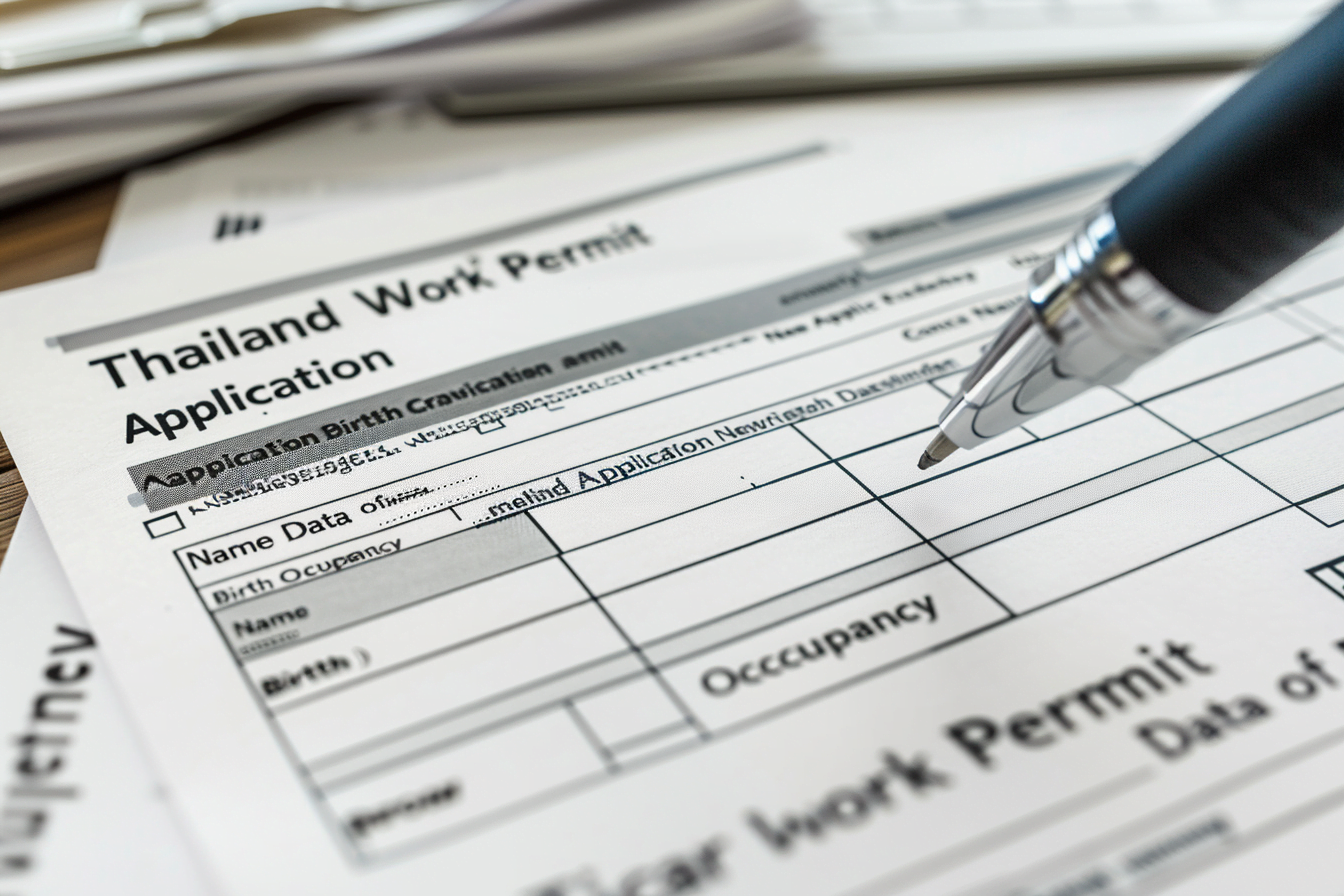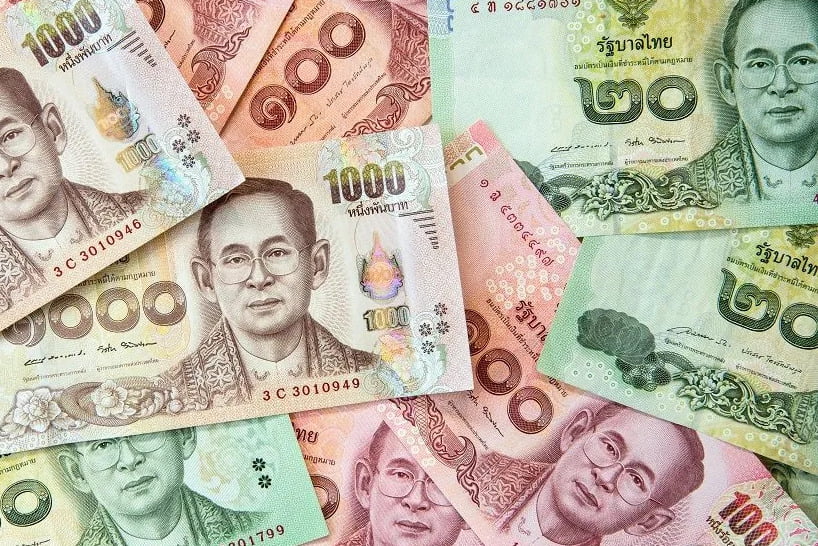Discover the costs associated with obtaining a Thailand work visa. Stay informed about the latest processing fees to plan your work journey effectively.
In a world where global mobility is the norm, a surprising number of over 200,000 foreigners apply for work visas in Thailand each year, illustrating the country’s allure as an expatriate hotspot. However, navigating through the maze of Thailand work visa processing fees, understanding the work visa cost in Thailand, and anticipating visa processing time Thailand can be a complex affair. It’s not just about packing your bags and heading to the ‘Land of Smiles’—there’s a meticulous financial and temporal commitment involved in securing your right to work.
Initiating your journey towards gainful employment in this Southeast Asian nation starts with comprehending the essential monetary figures. The seemingly straightforward path involves a series of costs that include fees for visa applications, work permits, and long-term stay permits. Grasping the full spectrum of these fees is crucial for a seamless transition to working and living in Thailand.
Key Takeaways
- A significant volume of foreign professionals apply for Thai work visas annually, indicating strong international interest in Thailand’s job market.
- The initial step in securing employment in Thailand is acquiring a Category “B” Non-Immigrant Visa, which is followed by a Work Permit and potentially a stay extension.
- Single-entry and multiple-entry Thailand work visa fees range from 2,000 to 5,000 Thai Baht, but may vary based on exchange rates and consulate policies.
- Applicants should stay informed about potential fluctuations in processing costs and time-frames, which can differ between countries and applicant circumstances.
- Accurately budgeting for the comprehensive cost of obtaining legal work status in Thailand is vital and can prevent unexpected financial surprises during the application process.
Understanding Thailand Work Visa Basics
When planning to work in Thailand, understanding the visa requirements and processes can streamline the experience and ensure legal compliance. Central to this preparation is becoming familiar with Thailand work visa requirements and the comprehensive work permit process, which starts with obtaining a Category “B” Non-Immigrant Visa.
What is a Category “B” Non-Immigrant Visa?
A Category “B” Non-Immigrant Visa serves as an entry point for professionals, business owners, and skilled workers who aim to pursue employment opportunities within Thailand. It’s a necessary precondition for applying for a work permit, thereby enabling the holder to legally engage in work-related activities in the country. While this visa does not independently authorize work, it is an integral part of the work permit process in Thailand.
Visa Implications for Employment in Thailand
Compliance with Thailand’s immigration and labor laws is paramount for all foreign workers in the country. Securing a Category “B” Non-Immigrant Visa is the first legal step towards employment in Thailand, as it is intricately tied to the subsequent acquisition of a Thai work permit. Without this visa, the process to legally work and reside in the nation cannot proceed, emphasizing its critical role in the labor landscape.
Who is Required to Obtain a Thailand Work Visa?
Any foreign national seeking employment in Thailand is mandated to obtain a work visa, with the exception of Thai citizens. The intricate protocol involves several requirements such as possessing a valid passport, the necessary application forms, and financial proof, alongside a formal Letter of Approval from the Thailand Ministry of Labour—a testament to the Thai government’s regulation of its workforce.
| Requirement | Description | Details |
|---|---|---|
| Valid Passport | Travel Document | Must have a minimum of six months’ validity remaining |
| Application Form | Visa Request | Completed and signed by the applicant |
| Passport Photo | Identification | A recent passport-sized photograph |
| Financial Proof | Economic Capability | Evidence of sufficient funds for the intended period of stay |
| Police Clearance | Background Check | A document certifying the applicant’s clean criminal record |
| Letter of Approval | Ministry of Labour Certification | Authorization from the Thailand Ministry of Labour |
If you’re planning to embark on an exciting career journey in Thailand, ensure to meticulously prepare the required documents and understand the Thailand work visa requirements. This will pave the way for a smooth transition into Thailand’s working community.
Comprehensive Guide to Thailand Work Visa Requirements
For those looking to navigate the Thailand work visa application process, understanding the intricate details of Thailand work visa requirements is crucial. Drawing on the official guidelines, this section outlines the essential documents and procedures to ensure compliance and a successful application.

- Valid Passport: Must be valid for at least six months beyond the date of entry into Thailand.
- Completed Application Form: Every applicant must provide a thoroughly completed, signed application form for the Thailand work visa.
- Passport-sized photo: Adhering to the specific dimensions and appearance guidelines set by Thai authorities.
- Proof of Financial Means: Evidence that shows sufficient funds for the duration of the stay in Thailand.
- Police Clearance: A certificate of a clean criminal record from the applicant’s home country or country of residence.
Additional documentation may be required for applicants engaged in specialized professions, such as teaching, where a letter of acceptance from the hiring institution or a Letter of Approval from a relevant Thai government agency may be necessitated.
It’s also vital for your future employer in Thailand to secure an approval from the Office of Foreign Workers Administration. This is to ensure that the number of foreign employees is compliant with Thai regulations. Moreover, with a valid work visa, foreigners gain access to Thailand’s Universal Coverage Scheme (UCS), reflecting the inclusive healthcare benefits extended to expatriates.
To help applicants understand the Thailand work permit fees for foreigners, the following table provides a detailed breakdown of costs associated with obtaining the work visa and subsequent permit.
| Visa/Permit Type | Fee | Duration |
|---|---|---|
| Non-Immigrant Visa (Single Entry) | 2,000 THB | 3 months |
| Work Permit (Up to 3 months) | 750 THB | Up to 3 months |
| Work Permit (3 to 6 months) | 1,500 THB | 3 to 6 months |
As you prepare your Thailand work visa application, factor in these associated costs and ensure you meet each requirement to facilitate a smooth transition and legal commencement of your employment in Thailand.
Step-by-Step Process: Applying for a Thailand Work Visa
Navigating the application process for a Thailand work visa involves several stages, from initial embassy contact to the submission of documents and final approval. Understanding the typical duration and processing timeframes is crucial in planning your move to Thailand for work purposes. This straightforward guide will detail the necessary steps involved in procuring your Thailand work visa.
Contacting Thai Embassies and Consulates
Start by reaching out to the Thai Embassy or Consulate within your jurisdiction to secure an appointment. Early contact is fundamental to ascertain the specifics of the visa fee payment method and gather information on the entire Thailand work visa application process. Individual embassies or consulates might have distinctive requirements or processing times, so it’s important to confirm these details upfront.
Documentation Submission for Visa Application
Gather all required documentation, ensuring the validity and completeness of each item to prevent any delays in processing. Your documents should reflect all criteria set out by the Thai authorities to facilitate a smoother application review and a timely decision.
Visa Application Review and Approval Process
After submitting your documents, the next phase is to wait for the review of your visa application. The visa processing time Thailand offices take can vary significantly, so factor this into your preparations. If your application is successful, you should enter Thailand within the stipulated Thailand work visa duration to stay in compliance with visa regulations.

| Type of Application | Processing Duration | Additional Notes |
|---|---|---|
| Regular Application | 7-10 Business Days | May vary by country or specific embassy/consulate |
| Expedited Application * | 3-5 Business Days | Subject to additional fees and eligibility |
| Conversion from Tourist Visa *** | Varies | Not guaranteed, dependent on eligibility and current visa status |
Note: Keep in mind that the ability to convert a tourist visa to a Non-Immigrant “B” Visa category is discretionary and may not be available to all applicants.
Thailand Work Visa Processing Fees
For professionals looking to embark on an employment journey in Thailand, understanding the associated costs of work visas is crucial. Thailand’s work permit framework is designed to be straightforward, but it comes with specific fees that applicants need to be aware of to ensure a smooth application process. Below we delve into the intricacies of Thailand work visa processing fees, including what to expect for single-entry versus multiple-entry visas, payment methods, currency considerations, and variations between countries.
Single-entry vs. Multiple-entry Visa Fees
The cost of obtaining a work visa in Thailand varies depending on the type of visa an applicant chooses. For a single-entry visa, the fee is typically set at 2,000 Thai Baht, which permits a one-time only entry into the country. Alternatively, for those anticipating the need to leave and re-enter Thailand multiple times, a multiple-entry visa is the preferred option with a fee of 5,000 Thai Baht. It’s essential to select the visa that best aligns with your work and travel plans to avoid additional work visa cost in Thailand down the line.
Payment Methods and Currency Considerations
How and in what currency the visa fees are paid can also vary. While some Thai Embassies or Consulates might accept payments in local currency, others may require the fee to be paid in Thai Baht. Payment can typically be made through cash or bank transfer but confirm the preferred method at the office where you will be submitting your application to prevent any missteps in your visa processing.
Variations in Fees by Country
It is important for applicants to note that the work permit fees in Thailand may fluctuate depending on one’s home country. This is largely due to the currency exchange rates and the economic relationship between Thailand and the applicant’s country. For the most accurate and up-to-date fee structure, prospective applicants are advised to directly contact and confirm with the respective Thai consulate or embassy.

Eligibility and Conditions for Thailand Work Permits
Understanding the work permit process in Thailand is crucial for foreigners aiming to work in the Kingdom. The process is governed by specific eligibility criteria and conditions that must be strictly adhered to both by prospective employees and their employers.
An integral part of this process involves assessing whether companies meet the Ministry of Labour’s directives. These directives stipulate that companies must present a certain degree of financial robustness, demonstrated through minimum registered capital and a consistent history of income tax payments. Additionally, companies are expected to actively contribute to the economy via foreign remittance and substantiate their commitment to local employment by hiring Thai nationals.
For those wondering about Thailand work permit fees for foreigners, it is pertinent to note that these costs are inherent to the process and are directly correlated to the applicant’s intended duration of employment in Thailand. Below is a detailed table presenting a snapshot of what companies must consider when hiring foreign nationals:
| Condition | Requirement | Details |
|---|---|---|
| Registered Capital | Minimum Threshold | Companies must showcase the minimum capital as set by the Thai Ministry of Labour. |
| Income Tax Payment | History | Documented evidence of regular income tax payments is essential. |
| Foreign Remittance | Contribution | Companies must display a pattern of contributing to the Thai economy through foreign currency remittance. |
| Employment of Thai Nationals | Ratio to Foreign Workers | Compliance with the stipulated ratio of Thai to foreign employees is mandatory. |
The work permit is also tied exclusively to the company and position for which it was initially granted. Any change in employment or a shift in office location necessitates notification to, and possibly reauthorization by, the Ministry of Labour, safeguarding the terms of the original work permit agreement.
Ultimately, the robust framework set for obtaining a work permit aims to balance the professional opportunities for foreigners while also securing the economic interests of Thailand. These firm but fair regulations underscore the importance of preparing thoroughly and aligning with the outlined eligibility criteria to ensure a successful application process.
Required Documents and Fees for a Thai Work Permit
Fulfilling the Thailand work visa requirements is an essential process for foreigners looking to work in Thailand. Both employers and prospective employees must be ready to present a complete set of legal documents to the Thai authorities. For employees, legal and valid personal documentation is crucial, including a passport, work visa, academic qualifications, and an employment contract. Evidence of appropriate housing or accommodation in Thailand and the company’s credentials are also required.
The employer must provide a comprehensive set of corporate documents such as the company registration certificate, VAT Certificate, and a current list of shareholders. It’s important to note that all personal documents need to be legalised and translated into Thai, and any company document should have an official stamp, generally the company seal, as well as the signatures of the directors managing the organization.
| Duration | Work Permit Fee |
|---|---|
| Up to 3 Months | 750 Thai Baht |
| 3 to 6 Months | 1,500 Thai Baht |
| 6 to 12 Months | 3,000 Thai Baht |
The work permit fees in Thailand are structured according to the length of time for which the permit is being issued. For foreigners, these range from 750 Thai Baht for short-term permits of up to three months, to 3,000 Thai Baht for permits lasting between six to twelve months. These fees reflect the governmental costs associated with the processing and issuance of a work permit in Thailand.
Understanding the precise Thailand work permit fees for foreigners prepares applicants for a smoother application process. It’s advisable to have these funds ready in the correct currency to expedite the procedure.
Duration, Extension, and Renewal of Thai Work Permits
When settling into a career in Thailand, understanding the thailand work visa duration and the work permit process thailand is vital for compliance and peace of mind. A deep dive into the specifics reveals that a nuanced approach to permit extensions and renewals is needed to navigate the rules effectively.
Initial Work Permit Validity Period
The Thai government issues work permits typically for a period of one year. However, if the work contract encompasses a shorter timespan, the permit duration aligns accordingly.
Procedure for Extending Work Permits
Ahead of expiration, extending a Thai Work Permit is contingent on meeting ongoing requirements like a validated work contract and proof of adequate earnings. It is paramount to initiate this extension process within the established time frames to avoid legal complications.
The Relationship Between Work Permit and Visa Extensions
Aligning work permit extensions with visa validity ensures uninterrupted employment and legal status within Thailand. To extend a Thai Work Visa, an application must be submitted no later than 90 days after arrival — crucially, before the current permit reaches its expiry date.
| Permit/Visa Type | Duration | Fees as of 2021 | Extension Requirement |
|---|---|---|---|
| Initial Work Permit | 1 Year or Contract Duration | Varies (current legislation reference) | Valid Contract & Sufficient Salary |
| Work Visa Extension | 1 Year from Entry | Submission within 90 days of entry |
In summary, navigating the thailand work visa fees 2021 and the intricacies of the permit and visa lifecycle is a critical element for any expatriate’s long-term stay and career in Thailand.
Conclusion
The journey to legally work in Thailand is marked by a clear yet intricate sequence of steps, all designed to ensure that foreign professionals can contribute to the Thai economy while remaining in full compliance with local immigration and labor laws. Navigating through the realm of Thailand work visa fees and work visa cost Thailand demands attention to detail and a proactive approach in assembling necessary documentation and meeting the stipulated legal prerequisites.
With the one-year initial validity period of the Thailand Work Visa and Permit, it becomes imperative for expatriates to plan for potential extensions to maintain legal working status. This foresight, coupled with an understanding of the Thailand work visa processing fees, allows for a smoother transition, avoiding any unnecessary interruptions to employment continuity.
Ultimately, investing time in comprehending every facet of this process is crucial. From securing the Category “B” Non-Immigrant Visa to adhering to work permit stipulations, and from considering the cost implications to adhering to the timely renewal protocols, each procedure plays a pivotal role. Thorough preparation thus serves as the backbone of not only a successful visa application but also an enriching professional tenure in Thailand.
FAQ
What is a Category “B” Non-Immigrant Visa for Thailand?
A Category “B” Non-Immigrant Visa is a type of visa specifically designed for individuals seeking to work in Thailand. It is the first step that must be taken before applying for a Thai Work Permit and subsequently for a long-term stay extension.
Who needs to apply for a Thailand Work Visa?
All foreigners who wish to work in Thailand, including those who are exempt from tourist visa requirements, must apply for a Thailand Work Visa before they can apply for a work permit or an extension of stay permit.
What documentation is needed to apply for a Thailand Work Visa?
Applicants for a Thailand Work Visa need to provide a valid passport, a signed visa application form, a recent passport-sized photo, proof of adequate finances for their stay, police clearance, and potentially other documents such as letters of acceptance and proof of employment depending on the employment type.
How do I apply for a Thailand Work Visa?
To apply, contact the responsible Thai Embassy or Consulate to set an appointment, submit the required documents, and pay the visa processing fees. After the application review, if approved, the visa must be used to enter Thailand within the given timeframe.
How much are the processing fees for a Thailand Work Visa?
The fees for a Thailand Work Visa are typically 2,000 Thai Baht for a single-entry and 5,000 Thai Baht for a multiple-entry visa. Note that these costs may vary slightly depending on the country due to currency fluctuations.
What does the Thai Work Permit application require from employers and employees?
Both employers and employees must provide various documents. For employees, these include the passport, work visa, academic certificates, employment contract, and proof of accommodation. Employers need to provide documents like company certification, VAT Certificate, and a list of stakeholders. All personal documents must be legalized and translated, and company documents should have the company seal and signature of Managing Directors.
What are the fees for a Thai Work Permit?
The fee for a Thai Work Permit ranges from 750 Thai Baht for up to three months, 1,500 Thai Baht for three to six months, and 3,000 Thai Baht for six to twelve months. Exact amounts should be confirmed with the Department of Employment as they are subject to change.
How long is a Thai Work Permit valid, and can it be extended?
A Thai Work Permit is generally valid for one year or the duration of the work contract, if shorter. Extensions are possible if the requisite conditions, such as a valid work contract and satisfactory salary, are met. An extension for the work visa must also be sought to maintain legality of stay.
Is the Thai Work Visa fee different based on the country of application?
Yes, Thai Work Visa fees can differ slightly between countries due to exchange rate variations. Always check with the specific Thai consulate or embassy to confirm the current fee and accepted payment method.
How does the Thai Work Permit affect the ability to stay and travel within Thailand?
A valid Thai Work Permit allows for legal employment in Thailand. Additionally, it is necessary to apply for an Extension of Stay Permit to reside long-term in Thailand for work purposes. A Re-Entry Permit should be obtained for those wishing to travel outside of Thailand without invalidating the extended stay permit.






Leave a reply